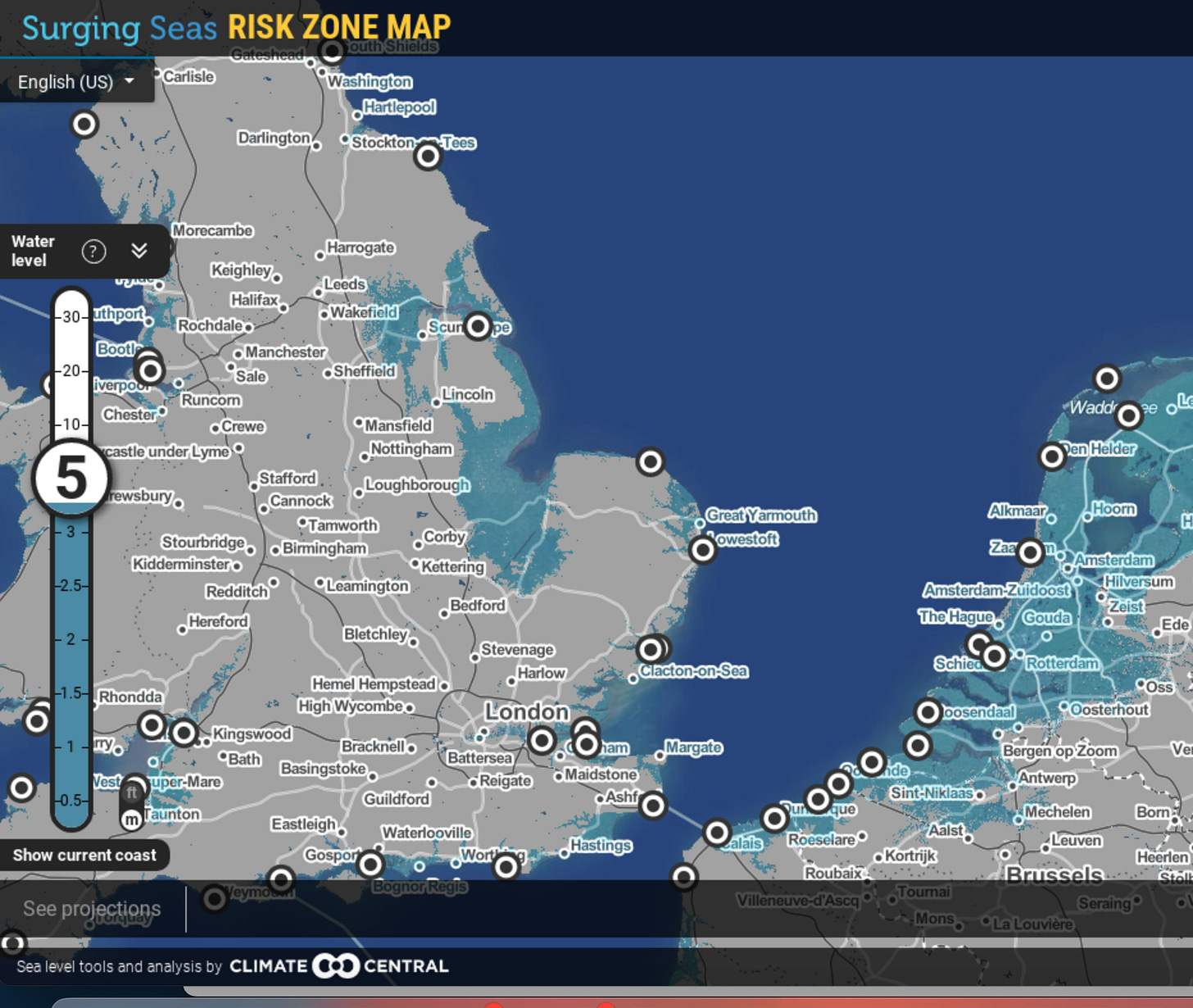Will new disclosure rules force more change than COP28?
What you measure, you manage. And yeah, there really was a 1909 conspiracy to kill solar.
Welcome back to Wicked Problems. The climatetech newsletter some people are saying aspires to the kind of dark energy Bassem Youssef used to melt Piers Morgan’s brain in his interview last week1.
Friend-of-the-show John Reynolds has a great exclusive interview with Energy Impact Partners’ London-based Nazo Moosa and Dublin-based Arthur Pierse in The Currency about EIP’s play in Irish climate tech.
Congrats to Professor Niall Mac Dowell on launching Xiron, a new London-San Francisco consultancy with deep CCUS, carbon removal, offsets, critical minerals and sustainable fuels expertise, along with Shell veterans Syrie Crouch and Sheila Graham and ex-UK civil servant Laura Hurley.
And in property news, researchers report a great opportunity to invest in beachfront real estate in Baton Rouge, or Brussels, or Bourne in Lincolnshire, currently 25 miles from the sea. Thanks to new British Antarctic Survey findings showing that the West Antarctic Ice Sheet is going to collapse even if we cap global warming at 1.5 C, resulting in a 5 meter sea level rise that’s now baked in. The only question is when.
Looking back on 2023, which will have had the more lasting impact on climate? A flashy update or dismal failure to reach consensus out of COP28 ? Or a bunch of slow-burning legislation and rules emerging in different jurisdictions that — slowly but surely — move climate solutions from voluntary to mandatory, from PR to IR, from CSR marketing to legal compliance, from the CMO to the CFO, from Twitter to the courts?
IPCC Chief Sets COP28 Expectations
In his maiden interview this morning on BBC Radio 4’s flagship Today programme, newish IPCC Chair Professor Jim Skea outlined his expectations for COP28 in Dubai, Skea’s first in the role.
For his first outing on Today, Skea was concise and diplomatic but left the informed listener in no doubt where he expects to be disappointed at COP:
His key points:
Faster than expected - extreme weather events and ocean and artic temps are happening as IPCC models predicted but much, much sooner than they thought.
COP28 will have “big emphasis on technology and innovation”, “given the next one is taking place in the Middle East”. By which he means? “..hydrogen, carbon capture and storage”, because they’re of interest to the regions, NOCs, basically.
Adaptation and loss and damage will have “big momentum”.
Any “side deals” like the trebling of renewables by 2030 are just that. Side deals.
When we reach Net Zero is less important than how many more gigatons of GHG are emitted when we do - so delays (esp predatory ones) to short-term and 2030 interim goals make the problem that much harder — and more expensive — in the out years.
“But the headline numbers on emissions… I wait with bated breath to see what comes out.”
Skea also refused to be drawn into singling out Gulf states - saying that there’s plenty of poor performance on emissions targets from every part of the world to go around.
Given the collapse of loss-and-damage funding talks Saturday (FT) - one of the supposed achievements out of COP27 — it was a bit surprising Skea would put hopes there for “big momentum”. Politico.eu had some excellent reporting on reactions.
As Cipher’s Bill Spindle reported last week, middle-income nations just getting ready to exploit oil and gas deposits and placing big financial bets are among those most resistant to keep those deposits in the ground. Countries including “Mozambique, Ghana, Tanzania, Senegal, Uganda and Mauritania in Africa and Guyana in South America — are expected to push for a middle path that includes both fossil fuels and renewables.”
In related news, the We Mean Business Coalition gave the FT’s Attracta Mooney a good scoop in the form of a joint letter Tuesday from more than 130 companies representing nearly $1 Trillion in revenue. The letter says that while the much-talked-about “side deal” goals are great — to ramp up renewables, increase efficiency, and help diversify energy sources in the Global South to leapfrog fossil fuels — they shouldn’t be allowed to distract from the main challenge. That is, phasing out the use of “unabated” fossil fuels.
That the “side deals” might wind up being the most positive headline out of COP28 is also telling. Given the insane momentum of solar PV in particular, which along with EV adoption (1 in 4 new cars in California, 1 in 5 in UK, 1 in 5 in the EU) is happening quickly, the momentum behind the transition is now mostly driven by market forces. Almost none of which can be credited to the formal COP process per se.
Which isn’t to say it’s the fault of COP. As Skea notes, it has a feature that’s either its great virtue or its fatal flaw: complete consensus is required. Only actions by individual governments have enforceability. Which is interesting...





